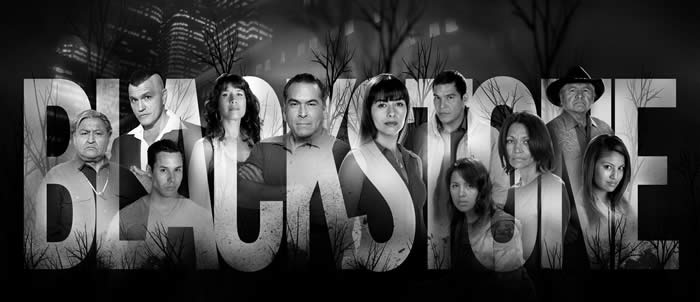Does gritty APTN series ‘Blackstone’ deserve a third season? Viewers weigh in on-line
Week in, week out, it’s perhaps the most consistently intense program APTN has ever offered.
I’m talking about Blackstone, a weekly dramatic series set in the fictional First Nation community of the same name. Tune in for any of the hour-long episodes and you can bet it won’t take long before the show re-ignites its often searing portrayal of rez life. Portrayed by a who’s-who cast of Aboriginal actors, the characters individually and collectively grapple with every issue imaginable. From youth suicide to tainted drinking water, alcoholism to missing women, Blackstone‘s explorations of violence, dysfunction and corruption are as current as they are controversial, a fact the creators make no apologies for.
And now that the show has just concluded its second season, I was curious what people thought of the series and whether its unflinching take on the darker side of Indigenous life resonated with or repulsed Aboriginal audiences. Off to the interwebs I went! And as you’ll see right off the hop, reaction is decidedly mixed.
Now, in case you were wondering, I do in fact watch the program, and do so regularly. And like joolzdaum, I sometimes find viewing Blackstone to be very much like witnessing a slow motion car crash, in that same ambivalent sense of not being able to look away from the carnage. So is that me being complicit in fetishizing or glamorizing Aboriginal dysfunction — a kind of poverty porn — as some critics charge? I’m still figuring it out, to be honest.
But what I can say now though is that, two seasons later, I am left wishing the show could pay more more narrative attention to the important distinction that needs to be drawn between those problems that are of Blackstone First Nation’s own making and those that come from outside (if I was more of a smartypants, I’d use words like endogenous and exogenous).
If Blackstone‘s characters are meant to be situated in an all-too-realistic, complex world — mirroring the exact kinds of Indigenous dysfunction we see and hear about regularly in the Aboriginal and mainstream media — then it must be acknowledged that a certain chunk of those maladies have their origins in what are, to a significant degree, foreign influences. After all, ‘Indians’ did not invent the Indian Act. Substandard, remote reserves were imposed upon us after we were pushed off our ancestral lands so non-Aboriginal cities could be built upon them instead. Our children have been perennially taken from us, generation after generation after generation — a potent recipe for inter-generational social implosion if there ever was one. Does Blackstone compellingly capture and convey those sometimes subtly exogenous (i.e., externally-influenced) aspects of our current situations? Can any television program?
Assuming it is renewed, I do look forward to where the series goes next, just as I look forward to the direction of the debate over how good of a job Blackstone does in representing and illuminating Indigenous realities.



I haven’t seen the show, but am reminded of my reaction to the movie ‘Once Were Warriors’. I appreciated that it offered a powerful and unflinching representation of intergenerational violence in Maori communities. I thought it was important that the issue wasn’t sugarcoated to make it more palatable for mainstream audiences. At the same time, these representations do need to be linked to the histories and power relations that create whatever current atrocities are being portrayed. I’m sure there must be a way to do that, even on TV, in one hour blocks. I appreciate the comments from some people to imagine a better future for ourselves, but we need to be realistic about where we’re starting from. I’ll have to tune in next season to see what they come up with!
The Series it’s self is good. The acting is good. But, the Camera Person can’t seem to hold the “camera” still for even a full minute. The camera is constantly bouncing around & is very Distracting.